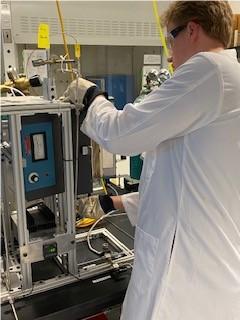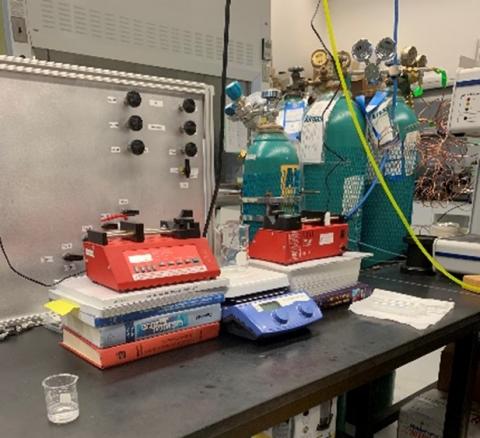Back-Up Plan Becomes a Passion

When I decided to attend UNH as an undergraduate in 2018, I had no idea that I would eventually end up being accepted to some of the top chemical engineering PhD programs in the country. Although I already had the goal of getting a master’s degree, a PhD seemed unattainable in my mind. Originally, as a first-year student I wanted to focus on joining student organizations and research was my back-up plan. However, after viewing presentations in my introduction to chemical engineering course about the research being conducted in the department, I reached out to Dr. Nan Yi to discuss research opportunities. Dr. Yi recommended that I apply for the Research Experience Apprenticeship Program (REAP) through the Hamel Center for Undergraduate Research. I did not know it then but REAP was the spark that ignited my path to applying for PhD programs.
During my REAP experience, I worked on synthesizing catalysts. I was basically trying different “recipes” to “cook” the optimal catalyst. While attaining my synthesis goals ultimately proved to be a challenge, I still enjoyed every minute of working in the lab. The combination of reacting chemicals to produce liquids of blue and green hues and the feeling of working to solve issues in sustainable energy production was exhilarating. Additionally, living in downtown Durham by myself for the first time in my life was a thrill as well. I had to learn to cook for myself, deal with the summer heat without AC, and utilize a laundromat. The taste of freedom was amazing, but more importantly, that summer inspired me to pursue a career in research.
REAP was not just a platform to attain other research opportunities, it was the true foundation of my research skills. That summer, I learned traditional skills like operating instruments and analyzing data, but I also learned to persevere, think creatively, and plan experiments. I learned to persevere when after multiple synthesis attempts, I still could not achieve the sample yield I desired. It was only through persevering and pushing myself to try different synthesis methods that I was able to achieve the target yield. My creative thinking skills were put to the test that summer when my syringe pumps were too small for my heating plates. This led me creatively design my own syringe pump system with books as shown in the picture.
Additionally, my REAP experience taught me how to plan experiments by modifying procedures found in the literature to fit my own project. Learning these skills enabled me to be successful in my later research experiences and as a senior looking back on my time at UNH, I realize that my REAP experience was the foundation from which I have built my scientific research career.

After completing my REAP project, I presented my findings at the American Institute for Chemical Engineers (AIChE) Annual Conference in the fall of 2019. The experience of having conducted research so early on in my undergraduate studies undoubtedly contributed to why I was offered prestigious internships like a Department of Energy Science Undergraduates Laboratory Internship (DOE SULI) and a National Science Foundation Research Experience for Undergraduates (NSF REU) at the University of Delaware. Although the DOE SULI was cancelled due to COVID-19, I was still able to participate in the NSF REU the summer before my senior year.
The research experiences I had after REAP continued to excite me and I decided to apply for chemical engineering PhD programs to continue my passion for research. Having a multitude of research experiences, all stemming from my REAP experience, gave me the confidence to apply to the top chemical engineering graduate programs in the country. My research experiences also gave me the credibility to be accepted to top chemical engineering graduate programs like Georgia Institute of Technology, University of Delaware, University of California Santa Barbara, and Columbia University. Being accepted to so many great programs made deciding where to attend graduate school a challenge, but I ultimately decided to attend Columbia University. These experiences have all been made possible by my first research experience during REAP, as well as by the continued support of the Hamel Center for Undergraduate Research through INCO classes, travel funds, and an honors thesis grant. I could not be happier with the way my undergraduate research career turned out and it is crazy to think that it all started as a back-up plan.
